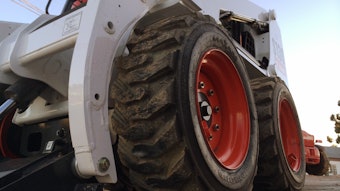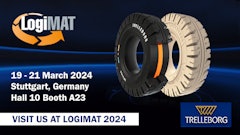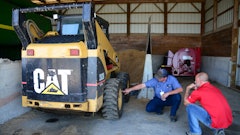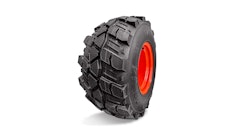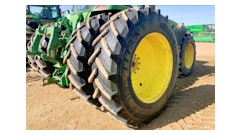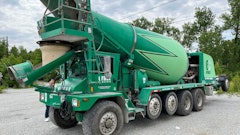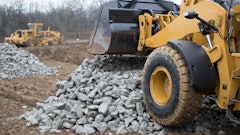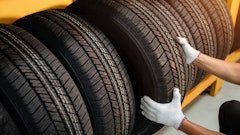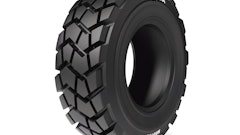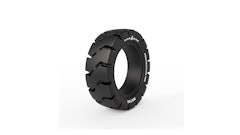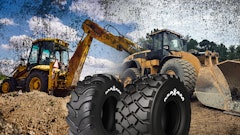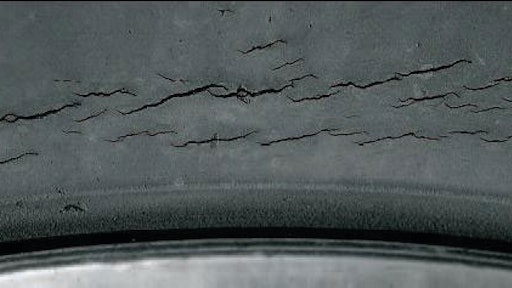
Your equipment trailers are important pieces of equipment for your rental business, as they're responsible for the safe and efficient transport of equipment from your yard to your customer's jobsite and back. As an equipment owner, you put a lot of focus on the safe loading and unloading of your trailers, proper tie-downs and so forth, but have you given much thought to the tires? If not, you should, since they do most of the "heavy lifting," of equipment transport.
You probably use a maintenance schedule for your trailers, just like you do with other pieces of equipment. Tire condition and air pressure are a part of that schedule, of course, but are you giving enough thought to the issue of tire aging?
What is 'tire aging'?
The structural integrity of a tire can degrade over an extended period of time. When that occurs, tires are more prone to catastrophic failure, which could at best cause an inconvenience, or at worst, lead to a crash. The degradation of a tire occurs over time, mostly the result of a chemical reaction within the rubber components. That aging process can be accelerated by heat and sunlight.
Research by the National Highway Traffic Safety Administration (NHTSA) suggests that tires age faster in warmer climates. Exposure to high ambient temperatures can accelerate the tire aging process, which could contribute to tire failures, including tread separations. Environmental conditions like exposure to sunlight and coastal climates, as well as poor storage and infrequent use, can hasten the aging process.
If your trailers are used frequently, tire aging will be less of an issue that it would for seldom-used vehicles. Under normal conditions, tires wear out and need to be replaced before aging becomes a safety concern. But those with occasional use could be susceptible. For example, the spares on all vehicles are prone to aging problems because they seldom get used or replaced. In those instances, the structural integrity of the tire can be weakened - and potentially hazardous - even though the tire still has a great deal of remaining tread.
How do you detect when tires have become unsafe?
The effects of aging may not be visibly detectable. Since there is no standard test to assess the serviceability of a tire, even an inspection performed by an expert might not always reveal the extent of tire deterioration. Vehicle owners are therefore encouraged to have their tires checked after five years of use, then annually thereafter. Making matters worse is the fact that tires sold as new can sometimes be years old. While they are, in fact, unused, degradation can still have already occurred but might be difficult to detect with the naked eye.
The age of the tire can be determined by checking the tire identification number on the sidewall of the tire, which begins with the letters "DOT". The last four digits represent the week and year the tire was manufactured. On newer model tires, the tire identification number is on the outside sidewall; older models will have the identification information on the inner sidewall.
While tire life will ultimately depend on the tires’ service conditions and the environment in which they operate, there are some general guidelines. Some vehicle manufacturers recommend that tires be replaced every six years regardless of use. In addition, a number of tire manufacturers cite 10 years as the maximum service life for tires. Check the owner’s manual for specific recommendations for your trailer. Remember, it's always wise to err on the side of caution if you suspect your trailer has tires that are over six years of age.
Are there other reasons for tire failure?
Poor maintenance is often cited as a cause of failure. While maintenance is important for good wear and safety performance of tires, many other factors contribute to their failure. Tire failures can be caused by a number of factors such as under- or over-inflation, overloading of trailers, road hazards, improper maintenance, structural defects, and improper installation, in addition to tire aging.
Most failures result in nothing more serious than minor property damage. For more serious crashes, NHTSA estimates that about 400 fatalities annually might have been attributed to tire failures.
Prevent tire failure
A tire that is worn, damaged or aged could fail as a blowout and result in loss of control of the vehicle. The principal indicators of deterioration are tread wear, tread and sidewall damage, and air leakage.
As the owner or manager of an equipment rental business, here are some questions to consider:
- Does the company have an established standard for indicating when tires should be taken out of service?
- Is the company standard in compliance with the minimum tread depth standards as specified by the Federal Motor Carrier Safety Administration?
- Are drivers and maintenance personnel trained and knowledgeable to make a determination during inspections as to whether or not a tire should be taken out of service?
Proper tire care is tantamount to trailer safety. Here are some maintenance tips:
- Check tires regularly to ensure they meet the minimum DOT tread depth requirement.
- Do not mount mismatched sizes, or pair tires in duals with significantly different wear.
- Do not mix bias and radial tires on the same axle.
- Follow company standards for out-of-service conditions.
- Replace tread only on sound casings.
In addition to sound maintenance, driving techniques can also play a role in tire wear and tear. Consider:
- During vehicle inspections, check tires to make sure their condition is within company-established out-of-service criteria.
- During a trip, monitor tires for road damage or deterioration.
- Look for: tread or sidewall separation, cuts or gouges, flat spots or uneven wear, leaks (monitor tire inflation), flat tires at duals
Maintenance, care and safe driving all contribute to optimum wear of your trailers' tires and resulting road safety. But you also can exercise some control when you purchase new tires. Don't just assume your new tires are, in fact, new. There is no law, Federal or State or local, to protect the consumer from someone selling you “stale tires." So be alert and when you purchase your new tires ask the seller to show you the DOT code and make sure your new tires are NEW, not old tires sold as “new tires."




